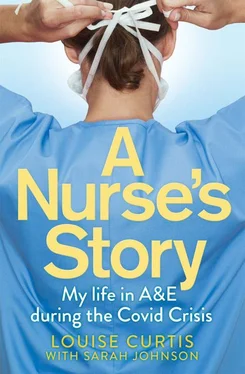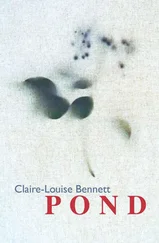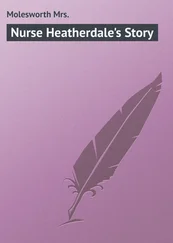The ambulance crew who handed the patient over knew very little about him and he was too unwell to talk to me. He was short of breath and using every muscle he could in an effort to get oxygen into his lungs. His oxygen saturations were at 52 per cent, which is terrible. They should have been above 90 per cent. His chest sounded like a whistling train. Despite the racket of the chaos going on around me, the sound of his chest was deafening. His blood gases showed that he was in respiratory failure. He was not in a good way.
I prescribed a load of drugs to try to open up his airways and improve his breathing. While my nursing colleagues were busy making up the medicines, I did some detective work and tried to find out as much as I could about my patient. I looked back through his records to see if he had been to A&E before, or had any clinic letters. I couldn’t find out anything. When the drugs were ready, we pumped them into him and waited.
After two hours of back-to-back nebulizers, steroids and magnesium, my patient was a new man. He could talk to me, even if it was only three words at a time. This was an amazing improvement. His blood gases were moving in the right direction and I felt like I’d achieved something massive. I, and my colleagues, had helped stop this man inching towards the point of no return.
Another patient in cardiac arrest came crashing through the doors and this time my colleague took charge. I was happy to hear later that the patient survived and had regained a pulse and a blood pressure, but only time would tell if she would ever recover enough to leave the hospital.
What a day. I got on my bike and on the ride home, a man wolf whistled at me. Pathetic. I ignored him and then later got annoyed at myself for not yelling a witty comeback that he would have heard as I rode past.
15
The Best and Worst of People
Back in majors, I was left on my own as the only clinician for a few hours while all available staff were sent to minors, which was heaving.
The department had changed again overnight. A second isolation unit had closed and been returned to its original state. We were left with just one unit with ten beds. The numbers of cold patients were far exceeding those with suspected Covid and we still had social-distancing measures to take into account so had to create more space to work in. We had still got patients with Covid fighting for their lives in intensive care and I was anxious about reducing our capacity to care for others with coronavirus. So far, more than 43,000 people had died deaths linked to Covid-19 in the UK. Daily deaths had fallen to below 100 on most days, but we were all painfully aware there might be a second wave.
Every hour I got a pop-up message on my computer screen reminding me of the anticipated increase in numbers this weekend as pubs were due to reopen. They were asking any staff who were available to work extra shifts. I thought about it – the extra pay would be welcome after all – but I had a sixty-hour week ahead of me and needed some time to decompress and rest. My mental health had taken a battering over the past few weeks and my confidence was wavering.
I saw a patient who was in a state of diabetic emergency. She was slumped on the bed and fidgeting with clammy skin because she’d been sweating so much. Her glucose levels were so high that our machines were unable to read them and give us a result.
‘I can’t get a reading for your blood sugar levels,’ I told her. ‘They are astronomically high.’
‘Hmm, I may have been a little over-indulgent during lockdown. I’ve got a bit of a thing for Terry’s chocolate oranges,’ she says. ‘I’ve been having one every other day.’
While listening to her confessions about her secret eating, I reflected on my own bad habits. I had certainly gained a few kilos since lockdown had started.
‘Erm, I’ve also been baking cakes every day and having them for pudding with a dollop of cream on top. But they are homemade.’
‘Right. I’m sure they have less preservatives than shop-bought ones, but they’ll still be full of butter and sugar. You need to try and cut down on the sweet stuff. Can you book an appointment with your diabetic nurse specialist to discuss what alterations you can make to your diet?’
‘Yes. I know it all already. I think it’s just because I’ve had nothing much else to do and have been comfort eating. I tend to do that when I’m anxious.’
While she had been over-indulging during lockdown, I was suspicious that there might be another reason why her sugars and other results were so deranged. When the lab phoned through with her glucose result, it confirmed which type of diabetic emergency she was in. She was transferred to resus where she could be more closely monitored while an insulin infusion was set up. She needed one-to-one care with regular blood sugar checks to monitor her glucose levels and make sure she didn’t go into a hypoglycaemic coma.
The rest of my shift was taken up with treating women who had suffered domestic abuse. One had tried to take her own life because she’d tried to escape but been caught every time. She couldn’t take any more. She told me: ‘At least if I’m dead, he can’t hurt me. He’s got weapons at home and he inflicts so much pain on me. Please, he can’t see me here.’
She had started to panic and so I tried to reassure her. ‘One good thing in this case about the pandemic is that we’re not letting any visitors in. They’re not allowed. You’re safe in here.’
The drugs she had taken in an attempt to end her life were no doubt exacerbating her fears and anxiety. They were in her system and there was little else I could do. She needed monitoring, but more importantly, she needed to be kept safe. As she was taken up to the ward I phoned the police to report the weapons and carried out a safeguarding referral so the team would see her as soon as possible.
The other woman I saw had left her abusive partner and been placed in a temporary safe house where he couldn’t find her. She’d recently left and was just starting out in her life without him when he found her and beat her almost to death. She had multiple rib fractures, a lung contusion and a bleed on the brain. I couldn’t imagine what she had endured to get into this state or how he could have kept hitting her to inflict all these injuries. It was also gut-wrenching that she had built up the courage to leave him and was just starting to get on with her life when he crashed back into it and destroyed all the progress she had made. She was admitted for further treatment and I hoped that once she got out, she would have the strength to carry on living and find happiness away from abusive men.
That shift had taken it out of me. I felt physically and emotionally battered after a tough couple of weeks and headed straight home. I was so thankful I wasn’t working over the upcoming weekend, with the 4 July easing of a load of restrictions in England. I couldn’t believe that pubs were opening while people in hospital still couldn’t have visitors unless they were at death’s door, and even then only one person was allowed in. It somehow didn’t seem fair. I spared a thought for my colleagues who were on duty and I wondered what the future now held for us in A&E.
One thing was certain, we had a long struggle in front of us. The numbers of people attending were on the rise and I shuddered with dread at the thought of how we would cope when winter came around. But then, I thought again, and marvelled at how we in the NHS had nimbly and effectively managed the tsunami of coronavirus patients that had threatened to drown us and destroy everything in its way. We were a hair’s breadth away from being overwhelmed but we’d coped and delivered outstanding care at every turn while everything around us was in a state of chaotic flux. I knew we would continue to weather any storm together, and in that respect I wasn’t alone. We would face whatever was to come together.
Читать дальше












